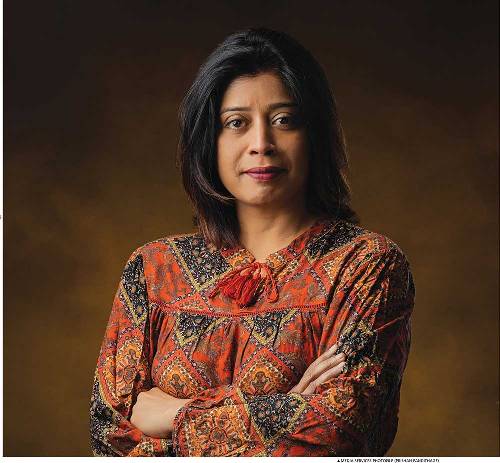At Jharkhand Governor Syed Sibte Razi’s Iftar party last Ramzan, former chief minister Shibu Soren came dressed as an Arab sheikh. He wanted to showcase his secular credentials at the photo-op. And he succeeded, too, as pictures of ‘sheikh Soren’ appeared in the media. But he did not realise that Indian Muslims didn’t wear such dress.
Was he taken in by the Arabisation of the Indian Muslim? Political scientist Ashis Nandy had said in an interview that India was witnessing the Arabisation of Islam. “At one time, Indian Muslims were proud that their Islam represented the best of the world’s traditions. But they are increasingly losing that confidence as a direct product of 19th century European scholars who claimed that West Asian Islam was the real Islam while other strands were influenced by local religions. These scholars endorsed fundamentalist Islam as the real Islam,” Nandy had said. He cited the example of Indonesia where western-educated women felt that the Islam of their parents was not good enough and introduced the hijab. “The same thing is happening in India. Muslims are virtually in uniform with skullcaps and kurta-pyjama,” Nandy said.
The metamorphosis has been gradual, but insidious. It has homogenised a religion that once found expression in many local forms across the country, having imbibed regional customs and accommodated religious syncreticism. Over the past three decades, fundamentalists have tried to homogenise Islam. The homogenising towards Arabisation emphasises rituals and codes of conduct over substance and Islam’s universalism.
Abdullah, a migrant from UP’s Firozabad now residing in Delhi, said he used to lead a “wayward” life. But his life changed dramatically when a group of Tablighi Jamaat, a Muslim revivalist movement, visited his village two years ago. Now he prays five times a day, and no longer plays cards, watches films or flirts. He gave up fashionable clothes for loose kurta-pyjamas and the keffiyeh, an Arabian head-dress. “I feel as if I am reborn,” he said, stroking his beard. His mission is to reform other Muslims, too.
In Delhi’s Nizamuddin area, many Muslim youth favour the thobe, a long, white, shirt-like dress. “It is the dress of our Prophet. It shows your love towards the Prophet,” Abdullah said. The crowd of Muslims, Hindus and Sikhs at the shrine of Sufi saint Hazrat Nizamuddin Auliya bears testimony to India’s heritage of religious syncretism. But an elderly Muslim at the entrance of the shrine is distressed by the growing influence of the Jamaat. “They are good Muslims. But they make young kids radical by spreading wrong words about the shrine and insist on particular rituals and dress,” he said. But Abdullah said, “These visitors to the shrine are on the wrong path. Don’t pray to a dead man. Go to the mosque instead.”
Madhav Bhandari, spokesperson for the Maharashtra BJP, said Islamic practices had changed in his native Konkan since his childhood days, when his Muslim neighbours spoke the same language and dressed like the Hindus. “There was a healthy interaction between Hindus and Muslims. We boys used to play together and religion was limited within the household. Now language has become the first barrier, with the Muslim youth preferring to speak in Urdu-enriched Hindi. Many don’t even know the local language any more. Why is there a sudden need to assert a homogenous Islamic identity, giving up customs they have lived with for generations?” he said.
The two aspects of Islamic culture in the Middle East are loyalty to the family and clan and a greater loyalty to the religion and the larger community of believers, the Ummah. “But this loyalty to the Ummah should not be misinterpreted,” said A. Yoonas, a Thiruvananthapuram-based engineer. “As per Islamic tenets, loyalty to one’s nation is very important. Identifying with Islamic identities is not supposed to be at the cost of national loyalty.” He said the concept of universal Muslim brotherhood was actually a positive one and should be approached as such.
Yoonas said there was a resurgence of fundamentalism in Muslim society. “In the past, no Muslim woman from south Kerala wore purdah. It is common now, a direct influence of Wahabi fundamentalism,” he said. He said devout Muslims had always wanted to read the Koran in the original language, Arabic.
Mansoor Khan, a Mumbai businessman, cited an Ayat (verse) from the Koran to prove that loyalty to the nation took precedence over loyalty to the Ummah in Islam. “There is a concept which says Hubbul-Watni-Minal-Iman, meaning loyalty, is a basic core of a Muslim. According to it, if you are not loyal to your country you are not loyal to Islam,” he said.
Perhaps, Indian Muslims have been feeling an increasing sense of loyalty to their religion and community because of the forces of globalisation and modernisation and a sense of perceived persecution that intensified as right-wing Hindu nationalism gathered strength. Events like the Babri Masjid demolition heightened their sense of alienation. This feeling also stems from the loss of Islamic power over the country. Muslim kings had ruled the Indian subcontinent for more than half a millennia, till the British colonised it. Dr Sheshrao More, a scholar from Maharashtra and author of Muslim Manacha Shodh (Islam: Maker of the Muslim Mind), argues in another book that the 1857 War of Independence was in fact a jihad waged by Indian Muslims to oust the British and regain lost power.
Globalisation and modernisation have been key factors in the evolution of the Indian Muslim. Indian Muslims have preferred Middle Eastern nations like the UAE, Saudi Arabia and Jordan to seek employment, as they were bound by ties of the Ummah. Gulf earnings helped many of Indian Muslims go for the Haj. The number of those who went to Haj was 31,000 in 1995. In 2000, Air India alone carried 71,924 pilgrims to Jeddah, and last year, the Indian government approved an increase in the number of Haj pilgrims who can get subsidy from 1,10,000 to 1,23,211.
“Indian Muslims exposed to the Middle East returned influenced by the material progress and lifestyle of the Arab world,” said commentator Muzaffar Hussain. But they were also influenced by the form of Islam practised in the Middle East. As preachers trained there came to India, the first imprints of Arabisation became evident. Shaista Amber, head of the Women Muslim Personal Law Board, however, said the Arabian influences were cosmetic—like using the sacred Aab e zamzam (holy water) for rites, developing a taste for palm dates, or bringing back the janamazi (prayer mat) or taibil (prayer beads).
More said Muslims in urban areas might be becoming more rigid in their observance of Koranic teachings but that did not mean they were getting Arabised. “On the other hand, most Indian Muslims in rural India are like other Indians,” he said.
Journalist Mir Ayub Ali Khan felt the migration of Muslims to Saudi Arabia for jobs over the past three decades might have influenced them. “There are obvious changes in the style of burqas women wear and the garb men prefer. Even children are being given more Arabic names. But this is restricted to a few people and is not a huge demographic phenomenon,” he said.
Delhi-based social analyst Dr Syed Mubin Zehra said the representation of Muslims in the media was hurting Islam’s image. The accused in the Batla House shootout were shown with their heads covered with the Arabic scarf, as if to show that Arabisation of Islam was taking place. “Islam came to this world through the most pious chosen Arab, Prophet Mohammad. This religion was revealed in Arabia at a time when Arabs were entangled in a state of anarchy. They were divided into qabilas and had evil practices like burying girl children. Islam rose out of such social and inhuman practices and became a religion practised worldwide,” she said.
According to journalist-commentator Muzaffar Hussain, the lower middle and middle class Muslims in India are less Muslim and more Indian. “But there is now a clash between Indianness and fundamentalism in the mindset of the Indian Muslim. With the growing influence of forces like the Taliban, the core religious corner of their mind says this is how Islam gained supremacy. But another part of them will always identify with their Indian culture and upbringing,” he said.
Islamic scholar Maulana Wahiduddin Khan felt there was an Indianisation of Muslims. “They have finally shed the legacy of the Muslim League and Partition. They don’t believe the Pakistani propaganda that there are no opportunities for Muslims in India,” he said. “Our only bond with Saudi Arabia is that Mecca is there. And that the Koran was first penned in Arabic.”
Mansoor Khan said the Arabs were no longer following true Islam and Arabisation would never take place among Indian Muslims. Said he: “If Arabs were to follow true Islamic law, there would have been democracy in the Arab nations. Our first caliph, after the Prophet, was democratically chosen.”
Post Disclaimer | Support Us
Support Us
The sailanmuslim.com web site entirely supported by individual donors and well wishers. If you regularly visit this site and wish to show your appreciation, or if you wish to see further development of sailanmuslim.com, please donate us
IMPORTANT : All content hosted on sailanmuslim.com is solely for non-commercial purposes and with the permission of original copyright holders. Any other use of the hosted content, such as for financial gain, requires express approval from the copyright owners.
 Sri lanka Muslims Web Portal Diversity and Inclusiveness – Sri Lanka Muslims
Sri lanka Muslims Web Portal Diversity and Inclusiveness – Sri Lanka Muslims




I personally am not aware of any Koranic text that can be taken as giving primacy to the nation over the ummah. As Dr Maruf points out the nation-state is a modern concept, and even in the older senses of the “nation” being taken as a people etc it seems very doubtful that primary can be given to any of them over the ummah. The important point is that Islam is very strongly universalist in outlook.My argument would be that many components from the secular realm go into the conception of the nation, wheres behind the notion of the ummah is the human being’s direct individual relationship with the trascendental, and a community constituted on that basis should surely have primacy over the nation. It is interesting, incidentally, that Maududi who was a very orthodox theologian was opposed to the creation of Pakistan on the ground that Islam had no place for the nation. It is interesting also that Jinnah wanted Pakistan to be a secular state.
Re “Mansoor Khan, a Mumbai businessman, cited an Ayat (verse) from the Koran to prove that loyalty to the nation took precedence over loyalty to the Ummah in Islam. “There is a concept which says Hubbul-Watni-Minal-Iman, meaning loyalty, is a basic core of a Muslim. According to it, if you are not loyal to your country you are not loyal to Islam,” he said.”
What is the chapter and verse reference from the Qur`aan for this opinion?
Taken literally, it seems erroneous. We must remember that “nation”, as in the formation “nation-state”, is a modern era concept, unknown at the time of the revelation of the Qur`aan.
This article on Arabisation among Indian Muslims could be of interest to our local Muslims among whom also the same process has been going on.